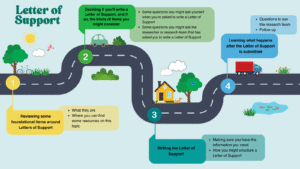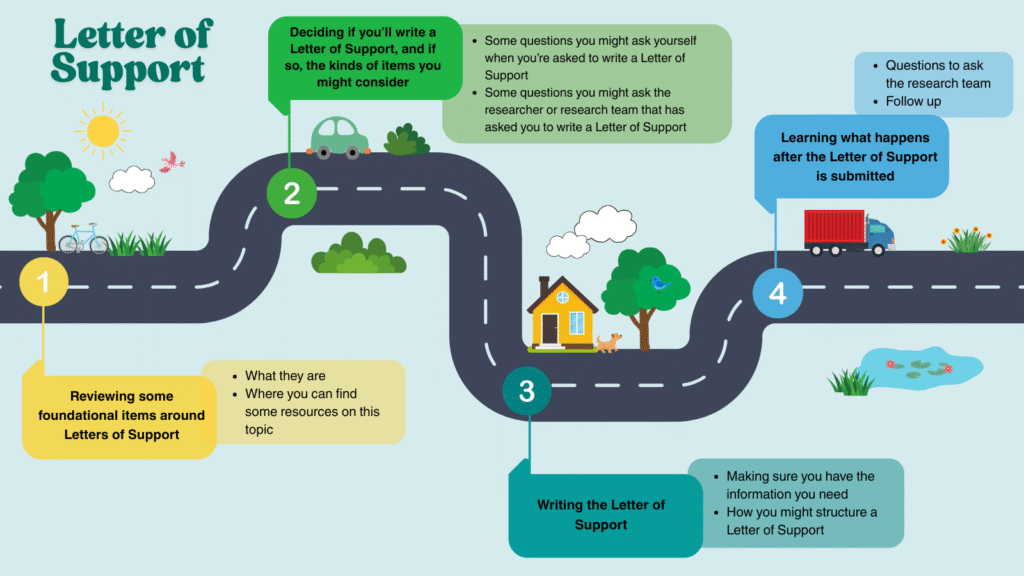Written by Deb Baranec, Jim Kempster, and Dawn Richards
Graphic Created by Tianna Magel
What is a Letter of Support and where is it used? Why have you been asked to write one? How on earth do you start to write a Letter of Support? Chances are, if you’re a patient partner in the research environment, you’ve asked yourself or someone else one of these questions as part of your role.
This resource has been co-created by patient partners based on their own experiences related to Letters of Support. We’ve created this resource for you if you’re a patient partner and you’ve been asked to write a Letter of Support for a researcher or research team. Of course, we’re also happy if others on the research team are familiar with this resource as well so they understand some of what patient partners go through when they’re asked to provide a Letter of Support.
As you work your way through the resource, you’ll move from:
1. Reviewing some foundational items around Letters of Support
• What they are
• Where you can find some resources on this topic
2. Deciding if you’ll write a Letter of Support, and if so, the kinds of items you might consider
• Some questions you might ask yourself when you’re asked to write a Letter of Support
• Some questions you might ask the researcher or research team that has asked you to write a Letter of Support
3. Writing the Letter of Support
• Making sure you have the information you need
• How you might structure a Letter of Support
4. Learning what happens after the Letter of Support is submitted
• Questions to ask the research team
• Follow up

We hope that this helps you to learn more about Letters of Support, make a decision about writing one, and knowing how to follow up (if the research team hasn’t) after the grant application is submitted.
1. Reviewing some foundational items around Letters of Support
A Letter of Support, also often called “LOS” for short, is a document that may be included as part of a grant application that is submitted to an organization that funds research. LOS are usually provided by people or organizations that will be involved in the proposed research project. Within the letter, information may be provided about how those people or organizations will contribute to the research, if they will provide any physical support such as money, or non-monetary support (sometimes called ‘in-kind’ support) and of course, offer their overall support for the proposed research being funded.
Different granting agencies or funding organizations will have different requirements for Letters of Support. These agencies or funding organizations might be government-supported, health charities, patient organizations, philanthropic organizations, and others.
The Canadian Institutes of Health Research (CIHR) has a webpage about Letters of Support with a lot of helpful guidance as well as some example language and characteristics of strong or weak Letters. This webpage is helpful whether you’ve never written a Letter of Support or have written a number of them.
2. Deciding if you’ll write a Letter of Support, and if so, the information you might consider or need
When you’re asked to write a Letter of Support, this may mean that you’re being asked to be part of the research team or it may simply mean that you’re being asked to express support for the research. We have generated some questions that you might ask yourself as well as the researcher or research team that has requested a Letter from you.
• Some questions you might ask yourself when you’re asked to write a Letter of Support. These might also help you with questions that you put together for the researcher or research team as well.
o Am I being asked to provide a Letter of Support to express support only, or will I be on the research team? If I’ll be on the research team – what does that role look like, and do I have time for it if the research is funded?
o Do I know this research team already, for example, have I worked with them before or is this continuing research that I’ve already been part of? Am I comfortable with their ask?
o How much time will it take me to write a Letter of Support, and do I have time to do that?
o Should I ask the research team to provide me with a draft Letter of Support that I can make my own?
o What other questions do I have for the research team specific to this ask?
This list of questions isn’t complete and there may be other questions you might want to ask yourself when you’re asked to write a Letter of Support too.
• Some questions you might ask the researcher or research team that has asked you to write a Letter of Support.
o What is your timeline for the Letter of Support?
o Am I being asked to write a Letter of Support expressing my support only, or will I be part of the research team?
o Can you provide me with information for the Letter of Support including who it should be addressed to, if there is a competition name or number that should be referenced, what the name of the research project is, when the project would take place if funded, where would the research be done, and how would I be contributing to the research project and how I would be recognized for this role and work?
o Can you help me write this? For example, do you have a template/guidance/or a draft Letter of Support that I can make my own? Are there Letter of Support instructions that have been provided by the granting agency or organization that can be shared with me?
3. Writing the Letter of Support
When you sit down to write the letter, make sure you have all the information from the research team that you need to write the Letter of Support, if they are not providing you with a draft to make your own. Whether or not you’re writing the Letter of Support from scratch, make sure that any personal details you share about your own story and healthcare experiences are only ones you are comfortable sharing. While the Letter of Support may not be shared publicly, you shouldn’t feel pressured to share any details that you don’t wish to.
One approach you might take to writing the Letter of Support is to cover the who, what, where, when, and how of your role and your support for the proposed research. For example:
• Who is the principal investigator of the application?
• What is the title or name of the research project, and what is your role in the research? What does this mean that you’ll be doing as part of the research team?
• Where is the research happening? For example, maybe it’s virtual, you’ll meet with the team from time to time in person, or maybe it’s being done in a hybrid way – some virtual and some in person.
• When is the research being done or what is the timeframe for it? Mentioning the length of the research project helps show that you are ‘in the know’ about the project.
• How do your experience and your skills align with the research project and its goals and anticipated outcomes? Remember that you only need to share what you’re comfortable sharing here. And how will the anticipated results of this research contribute overall to knowledge, patient outcomes, etc.?
You might also choose to wrap up your Letter of Support with wishing the researcher success in their application and expressing how you are looking forward to learning about the results of the competition.
4. Learning what happens after the Letter of Support is submitted
Usually there is a few months’ time between when a research team submits a grant application to knowing the results of the funding competition. If the research team doesn’t offer it up, it’s more than ok to ask them when you can expect to hear about the results of the competition when you provide your Letter of Support to them.
At the same time, sometimes research teams forget to let people who have written Letters of Support about the outcome of the funding competition. It’s not a great feeling when this happens, but it does sometimes happen. If this is the case, don’t feel like you’re bothering anyone if you do reach out to ask about the results of the funding competition and if they’re known yet.
Good luck in your work writing Letters of Support! We hope this resource has helped you understand more about Letters of Support and will help you when you’re approached to write one.

